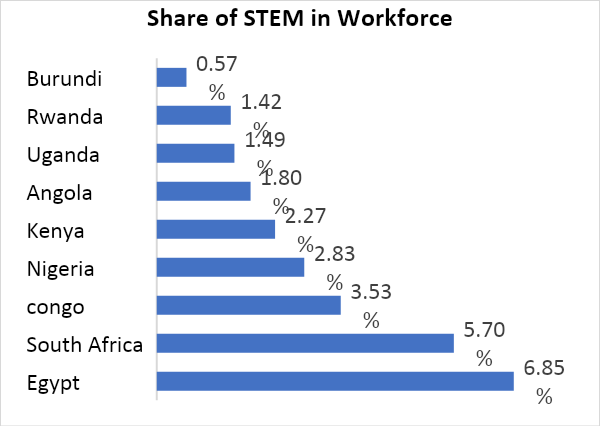
A crucial aspect of the digital ecosystem is the availability of skills and education necessary for effectively utilizing and developing digital technologies. With the advancement of technology and increased connectivity, digital education has become a powerful tool in transforming learning experiences, expanding access to higher education, and meeting the demands of the post-industrial economy across the continent.
The Digitalization Drive
Africa has experienced a surge in digitalization, with governments and private organizations investing heavily in enhancing digital infrastructure. This has resulted in increased access to the internet and mobile technology, bringing new opportunities for education and skill development. As digitalization sweeps across the continent, it holds the potential to democratize education and open doors to new learning possibilities for millions.
Demand for Digital Skills: Identifying Key Players
From the World Economic Forum (WEF) data, I.C.T, Engineering, and Sciences were identified as core STEM fields, and their prevalence in the workforce of different African countries was examined. Egypt (6.85%), South Africa (5.7%), Congo (3.53%), and Nigeria (2.83%) stand out as the nations with the highest share of STEM fields in their workforce, indicating a greater need for digital skills in these regions. With regard to demand for digital skills Egypt (31%), South Africa (25%), Nigeria (12%), and Congo (11%) emerge as the top four African countries with the highest demand for digital skills. These findings present a promising outlook for job seekers and policymakers, highlighting potential opportunities for skill development and economic growth in these nations.


The Digital Skills Gap
In the face of a rapidly evolving digital frontier, African economies are currently at risk of falling further behind due to significant gaps in infrastructure, technology, and skills that pose both challenges and opportunities for the future of digital education in Africa. The lack of access to quality education and relevant training programs impedes the development of digital competencies among the workforce. Additionally, disparities exist between urban and rural areas, where limited access to technology hinders the spread of digital education in remote regions.
Factors Contributing to the Gap
Education Infrastructure: Inadequate educational infrastructure, including a lack of computers, tablets, and reliable internet connections, presents a major challenge for integrating digital education into classrooms.
Teacher Training: A dearth of teachers proficient in digital tools and methodologies obstructs the effective adoption of technology in the education sector.
Content Localization: The scarcity of localized digital content that caters to the diverse cultures and languages in Africa affects the engagement and relevance of digital learning materials.
Affordability: High costs associated with digital devices and internet connectivity make it difficult for many African families to participate in digital education.
Potential Solutions
To foster digital empowerment in Africa and bridge the skills gap, several initiatives can be undertaken:
Specialization in STEM: African universities can play a pivotal role by focusing on specialized STEM-related fields, and providing quality education to produce a skilled workforce.
Skill Development Programs: Skill development programs should be promoted, catering to both young individuals entering the job market and professionals seeking to upskill.
Investment in Education and Infrastructure: Governments and private sectors across Africa need to prioritize digital education in their agendas, allocating resources to improve educational infrastructure, including access to computers and reliable internet connectivity to facilitate digital learning, support teacher training programs, and subsidize digital devices for students.
Public-Private Partnerships: Collaboration between the public and private sectors can facilitate the creation of relevant digital content and foster innovation in education.
Teacher Training Programs: Investing in comprehensive and ongoing teacher training initiatives will empower educators to integrate technology effectively into their teaching methods.
Internet Connectivity: Expanding internet infrastructure and making it more affordable will ensure that even remote areas have access to digital learning resources.
Mobile Learning: Leveraging the widespread adoption of mobile technology can help overcome the digital divide, as smartphones can become a powerful tool for delivering educational content.
“it is crucial to address the existing digital skills gap …by prioritizing STEM education”
The digitalization of education in Africa offers immense potential for transforming lives and nurturing a digitally skilled workforce that drives economic growth. While the region faces challenges in meeting the growing demand, it is crucial to address the existing digital skills gap and invest in solutions that ensure equal access to quality education for all. By prioritizing STEM education, investing in infrastructure, and promoting skill development programs, Africa can harness the power of digital education to unlock a brighter future for its people, fostering innovation, and creativity. Embracing digitalization in education will not only benefit individuals but also propel the continent toward sustainable economic growth and development. The journey may be challenging, but the destination holds the promise of a more inclusive, digitally empowered Africa.
*Ucheoma Cynthia Ekejiuba is a Research Associate at CSEA Africa. She specializes in research analysis, with a particular focus on financial econometrics.




